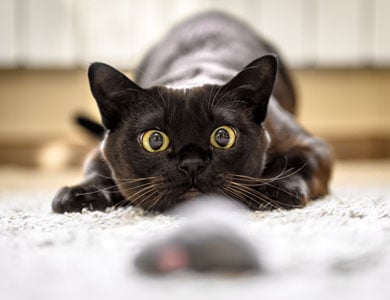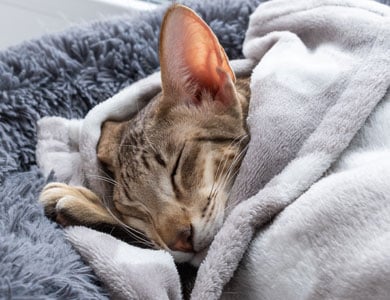Having a cat that meows at night and disrupts your sleep can be a source of frustration. Don't worry; you're not alone in this situation! This article will explore the reasons behind these behaviours and provide practical tips to help you regain peaceful nights.

The natural rhythm of cats
Domestic cats are commonly believed to be nocturnal animals, but that is not entirely true. Their ancestors first lived in deserts and were probably more active as the sun's heat decreased. As a result, most cats are crepuscular creatures and tend to be more active during dawn and dusk. Additionally, domestic cats are highly adaptable to their environment and often adjust their circadian rhythm to match their human companions.
However, like their wild counterparts, domestic cats still have the ability to hunt at night due to their exceptional night vision. Understanding this natural behaviour can help you appreciate your cat's innate tendencies and explain certain behaviours, such as increased activity during the twilight hours.
Understanding nocturnal meowing
Understanding why your cat meows at night is essential to manage the situation better. Your furry friend might do it to communicate, get attention, or signal distress. They could be hungry, want to play, or be looking for a mate. Paying attention to the context of the meowing can help you figure out the underlying cause.
Also read: Why do cats meow?
Helping your cat sleep at night
Creating an ideal sleeping environment for your cat ensures a peaceful night's rest. Here are some tips to help your feline companion sleep soundly:

A sleep-friendly environment
Providing your cat with a comfortable, quiet, and safe sleeping area is important. A cosy cushion with warm blankets and a calm atmosphere can create an ideal resting space for your furry friend.
Physical and mental stimulation
To ensure your cat gets a good night's sleep, keep them active during the day. Encourage playtime and exercise to help your feline friend expend their energy. Providing toys and a cat tree can also help to keep your cat's environment stimulating, as boredom can lead to excessive meowing.
It's a good idea to offer your cat toys to keep their mind engaged and active, like puzzles or treat-dispensing balls. Interactive feeding bowls that require your cat to work for their food are also recommended, as they can help your cat expend energy and improve their sleep quality at night.
By keeping your cat physically and mentally stimulated, you can ensure they get the rest and exercise they need.
Also read: The many benefits of playing with your cat every day
Avoiding unwanted behaviors
In most cases, people unintentionally reinforce their cat's nighttime meowing. If your cat meows excessively, here are some practical tips to discourage this undesirable behaviour.
Tips to discourage nighttime meowing
When your cat meows, don't give them any attention. You mustn't respond to their meowing; ignore it. However, if you have concerns about their health or fear they might be stuck somewhere, get up and check on them, but don't look directly at the cat. If you see that your cat is okay, go to the sink, turn the faucet on and off, and then return to bed without paying attention to the cat. This way, your cat won't feel like you got up for them.

However, if the meowing has been ongoing for weeks and usually occurs at the same time, a different technique may be needed. The behaviour is likely learned, meaning your cat had a reason to meow initially, and the behaviour has been reinforced. In such cases, consulting a feline behaviour specialist may be necessary to understand and correct the behaviour.
Signs of health issues
Excessive nighttime meowing can sometimes signal underlying health problems in your cat. Pay attention to these signals, and if meowing becomes persistent and unusual, consult your veterinarian to rule out any medical causes.
If your cat shows additional signs such as loss of appetite, lethargy, or changes in its habits, seek a thorough examination promptly. Ensuring your cat's health is crucial, and any significant variation in their behaviour deserves special attention.
Understanding and managing your cat's nocturnal meowing requires a holistic approach. By addressing their physical needs, stimulating them mentally, and discouraging undesirable behaviours, you can contribute to more peaceful nights for you and your feline companion.
Sleep soundly: